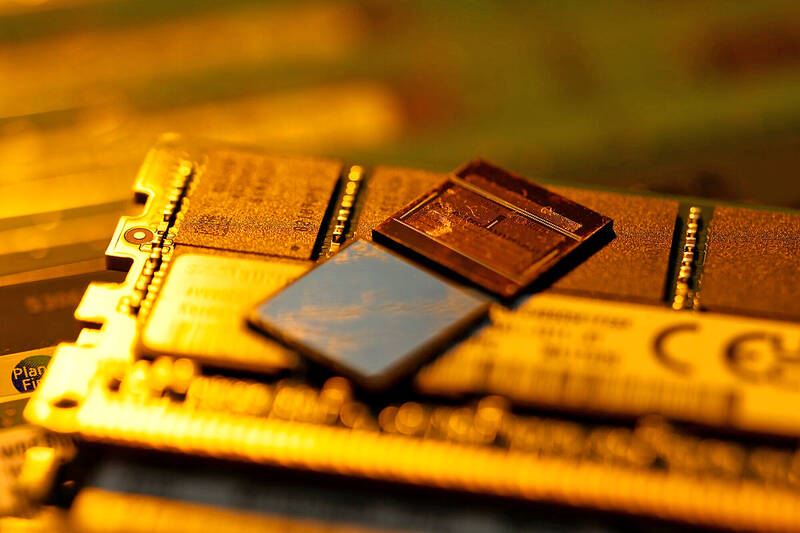Samsung Electronics Co is replacing the head of its semiconductor arm, appointing a longtime memorychip veteran to spearhead efforts to catch up with SK Hynix Inc in the booming artificial intelligence (AI) arena.
Samsung named Jun Young-hyun the new leader of its most important business line. He replaces Kyung Kye-hyun, who is to head up Samsung’s Advanced Institute of Technology and the future business team.
Jun, 63, joined the division in 2000 and helped the company develop its basic DRAM and flash memory chips for smartphones and servers.

Photo: Bloomberg
The appointment comes after Kyung offered to step down from his post, a person familiar with the matter said.
Samsung has fallen behind SK Hynix in high-bandwidth memory (HBM) chips, which have seen explosive growth because they are used for training AI models such as ChatGPT.
“It’s unusual for Samsung to do this management change in the middle of the year,” CLSA Securities Korea Ltd analyst Sanjeev Rana said. “This highlights Samsung’s desperate attempt to inject new energy and fresh thinking into its semiconductor business, where its lead has been slipping away.”
In addition, Jun’s appointment comes at an age when most Samsung executives retire, Rana said.
“His expertise was deemed necessary to help Samsung navigate the current challenging situation,” he said.
SK Hynix is the biggest supplier of memory used to develop ChatGPT-like services around the world. Its production capacity for such chips is almost fully booked through next year.
The firm plans to spend about US$14.6 billion building a new complex in South Korea to meet demand for HBM chips, which work alongside Nvidia Corp accelerators in creating and hosting AI platforms. It is also building a US$4 billion packaging facility in Indiana — its first in the US.
Samsung, which also makes logic chips and operates a foundry business, has also embarked on a global expansion that encompasses a US$40 billion investment in US chipmaking.
In the foundry business, Samsung has struggled to win big customers and narrow Taiwan Semiconductor Manufacturing Co’s (台積電) overwhelming lead in producing advanced chips.
Samsung has begun mass production of its latest HBM product, eight-layer HBM3E, and says it plans to mass produce 12-layer HBM chips in the second quarter of this year.
The company expects its supply of HBM to increase by at least three times this year compared with last year.

Nvidia Corp’s demand for advanced packaging from Taiwan Semiconductor Manufacturing Co (TSMC, 台積電) remains strong though the kind of technology it needs is changing, Nvidia CEO Jensen Huang (黃仁勳) said yesterday, after he was asked whether the company was cutting orders. Nvidia’s most advanced artificial intelligence (AI) chip, Blackwell, consists of multiple chips glued together using a complex chip-on-wafer-on-substrate (CoWoS) advanced packaging technology offered by TSMC, Nvidia’s main contract chipmaker. “As we move into Blackwell, we will use largely CoWoS-L. Of course, we’re still manufacturing Hopper, and Hopper will use CowoS-S. We will also transition the CoWoS-S capacity to CoWos-L,” Huang said

Nvidia Corp CEO Jensen Huang (黃仁勳) is expected to miss the inauguration of US president-elect Donald Trump on Monday, bucking a trend among high-profile US technology leaders. Huang is visiting East Asia this week, as he typically does around the time of the Lunar New Year, a person familiar with the situation said. He has never previously attended a US presidential inauguration, said the person, who asked not to be identified, because the plans have not been announced. That makes Nvidia an exception among the most valuable technology companies, most of which are sending cofounders or CEOs to the event. That includes

INDUSTRY LEADER: TSMC aims to continue outperforming the industry’s growth and makes 2025 another strong growth year, chairman and CEO C.C. Wei says Taiwan Semiconductor Manufacturing Co (TSMC, 台積電), a major chip supplier to Nvidia Corp and Apple Inc, yesterday said it aims to grow revenue by about 25 percent this year, driven by robust demand for artificial intelligence (AI) chips. That means TSMC would continue to outpace the foundry industry’s 10 percent annual growth this year based on the chipmaker’s estimate. The chipmaker expects revenue from AI-related chips to double this year, extending a three-fold increase last year. The growth would quicken over the next five years at a compound annual growth rate of 45 percent, fueled by strong demand for the high-performance computing

TARIFF TRADE-OFF: Machinery exports to China dropped after Beijing ended its tariff reductions in June, while potential new tariffs fueled ‘front-loaded’ orders to the US The nation’s machinery exports to the US amounted to US$7.19 billion last year, surpassing the US$6.86 billion to China to become the largest export destination for the local machinery industry, the Taiwan Association of Machinery Industry (TAMI, 台灣機械公會) said in a report on Jan. 10. It came as some manufacturers brought forward or “front-loaded” US-bound shipments as required by customers ahead of potential tariffs imposed by the new US administration, the association said. During his campaign, US president-elect Donald Trump threatened tariffs of as high as 60 percent on Chinese goods and 10 percent to 20 percent on imports from other countries.